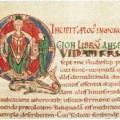206. Eileen Sweeney on Anselm
Anselm expert Eileen Sweeney discusses his approach to philosophy and the devotional aspect of his works.
Themes:
• E. Sweeney, Anselm of Canterbury and the Desire for the Word (Washington DC: 2012).
• E. Sweeney, “Anselm and the Phenomenology of the Gift in Marcel, Sartre and Marion,” in G.E.M. Gaspar and I. Logan (eds), Saint Anselm of Canterbury and His Legacy (Toronto: 2012), 385-404.
•E. Sweeney, "The Problem of Philosophy and Theology in Anselm of Canterbury," in K. Emery and R. Friedman (eds), Medieval Philosophy and Theology in the Long Middle Ages (Leiden: 2011), 487-514.
• E. Sweeney, Logic, Theology and Poetry in Boethius, Abelard, and Alan of Lille: Words in the Absence of Things (New York: 2006).
• E. Sweeney, "Rewriting the Narrative of Scripture: 12th Century Debates Over Reason and Theological Form," Medieval Philosophy and Theology 3 (1993), 1-34.







Comments
Anselm's personal emotional involvement and Plato
The question of texts which do not only show the argument itself but also personal involvement, how it was explored, what one believes, which emotions are stirred up, etc., goes back to Plato, Plato's nested dialogues, and Platonic Myths, directly. And the problem to distinguish what the author meant in which way and how to recognize the difference of invention and reality from an ancient perspective through modern eyes is a never-ending problem with Plato's texts, too. Anselm's Proslogion with appendices (Gaunilo's reply etc.) shows a certain dialectic structure, too, and philosophy starts to become interesting exactly when we have to guess and to postulate, i.e. to jump into "eikos mythos" (Timaeus 29d).
Anselm not of Canterbury
I am grateful for the references, more than once, to St. Anselm's prayers and meditations. When we hear the description "of Canterbury," we may think that he was English. In fact, he was Italian. I was quite surprised, the first time I read one of his prayers, to find out that they seem as though they could have come from the Spanish Baroque. (E.g., Lope de Vega, Soliloquios.) Fascinating figure.
Thanks for this excellent podcast and series.
Add new comment